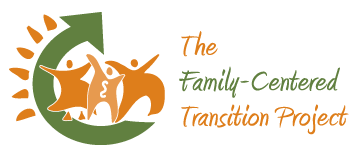
The Family-Centered Transition Project is a collaboration between the Institute on Disability and the Center for Community Inclusion and Disability Studies at the University of Maine, to demonstrate an innovative approach to the transition of individuals with autism spectrum disorders from high school to adult life.
The transition services consist of three components over a 6-8 month period:
- Training sessions where families learn practical strategies for person-centered planning, networking, and utilizing a variety of adult service options and resources to design and work towards a positive future beyond high school.
- A series of individual planning meetings to plan post-high-school goals, held at the convenience of each student and family, with assistance from a project planning facilitator. The planning results in a family-centered plan with specific goals and an implementation plan. Other family members, friends, and community resource people may participate in one or more meetings as called for by the student and family. The facilitator meets with each student to prepare them for maximum participation in these planning meetings.
- Ongoing assistance from a planning facilitator in implementing student plans. This includes career exploration activities with students to investigate career options, such as (a) informational interviews, (b) job shadowing experiences, (c) online or in-person investigation of post-secondary options, and/or (d) unpaid or paid work experiences. Project staff assist students and families to incorporate elements of student plans into their IEPs.
Beginning in October 2011, the Institute on Disability received additional funding for three years from the National Institute on Disability and Rehabilitation Research for a new phase of the project: Sustainable Implementation of Family-Centered Transition Planning. In this phase, the IOD partnered with a community organization in each state to develop a sustainable capacity for a community organization to provide Family-Centered Transition Planning.
In this phase, staff continued to work with schools and adult service programs supporting students with ASD in NH and ME to serve additional students. In ME, the Autism Society of Maine took the lead on sustainable implementation. In NH, the IOD is partnering with Diversity to continue to provide Family Centered Transition Planning.
The Institute on Disability is evaluating consumer and family outcomes and disseminating information to promote this service as an evidence-based practice in NH and ME and with communities in other states upon request.
The Family Centered Transition Project is a three-year, $600,000 project funded by the U.S. Department of Education, National Institute for Disability and Rehabilitation Research (NIDRR), under grant H133G110158. The contents do not necessarily represent the policy of the U.S. Department of Education and you should not assume endorsement by the Federal Government.
Resources & Links
Project History
In the first phase of project work, the Family-Centered Transition Project served 47 students with ASD age 16-18, based on referrals from 16 schools in NH and 14 in ME, to study the effectiveness of the approach.
Students were randomly assigned to a Year 1 or a Year 2 group. The Year 1 group received services beginning at enrollment, and services for the Year 2 group were delayed for one year. Tests showed that both groups were equivalent in age, gender, ethnicity, and level of adaptive behavior.
Standardized surveys were administered to both groups at the beginning of the project, and again after one year, to measure the impact of the project on student and parent expectations for the future, self-determination, and vocational decision-making ability. These factors have been shown to have a strong positive relationship with post-school success.
At the end of the first year, statistical analysis showed that the students who received Family-Centered Transition Planning had significantly higher:
- Student Expectations for the future,
- Parent Expectations for the future,
- Self-Determination, and
- Vocational Decision-Making ability
None of these variables improved significantly during Year 1 for the group that had services delayed until after the first year.
The transition section of students’ Individual Education Plans (IEPs) were also analyzed before and after participation in the project. The quality of transition goals for students receiving Family-Centered Transition Planning showed a significant increase, while the control group IEPs improved only slightly.
In addition, the project conducted interviews with a subset of nine families about their experiences for qualitative analysis.
Initial grant funding for the project ended in August 2011. The results are being widely disseminated through published articles and conference presentations.
The Family Centered Transition Project (Phase 1) was funded by a two-year, $800,000 grant from the U.S. Department of Health and Human Services, Health Resources and Services Administration, Maternal and Child Health Research Program.